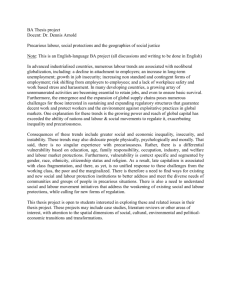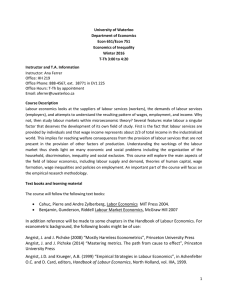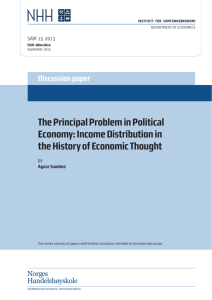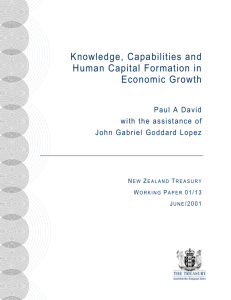Course Outline - University of Victoria
advertisement
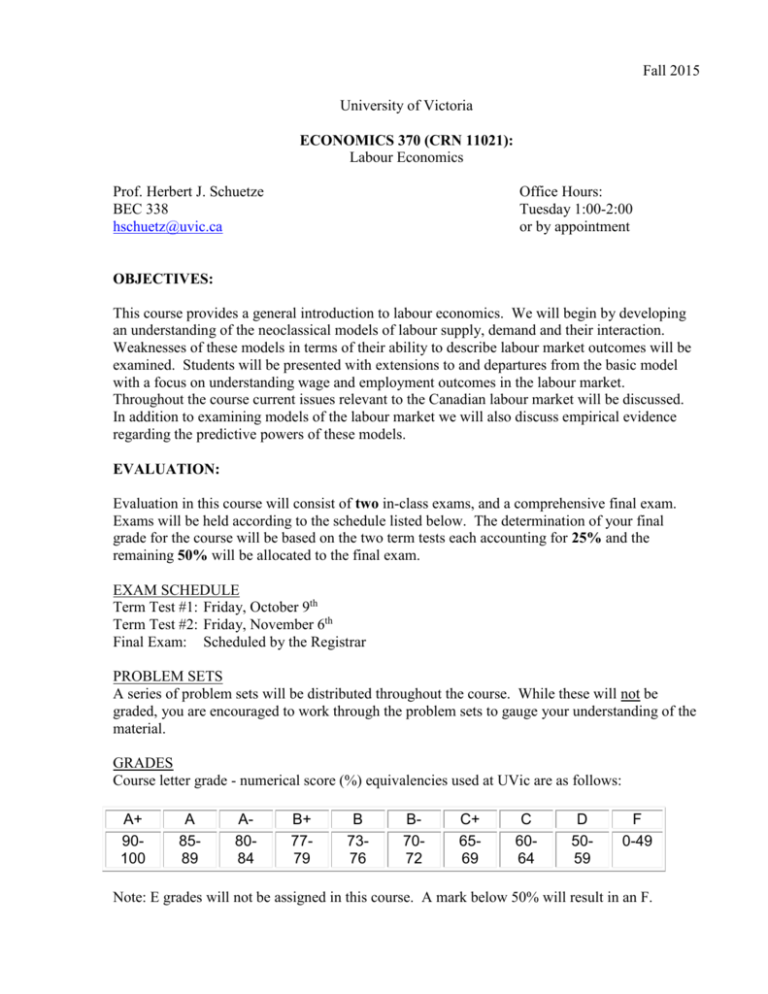
Fall 2015 University of Victoria ECONOMICS 370 (CRN 11021): Labour Economics Prof. Herbert J. Schuetze BEC 338 hschuetz@uvic.ca Office Hours: Tuesday 1:00-2:00 or by appointment OBJECTIVES: This course provides a general introduction to labour economics. We will begin by developing an understanding of the neoclassical models of labour supply, demand and their interaction. Weaknesses of these models in terms of their ability to describe labour market outcomes will be examined. Students will be presented with extensions to and departures from the basic model with a focus on understanding wage and employment outcomes in the labour market. Throughout the course current issues relevant to the Canadian labour market will be discussed. In addition to examining models of the labour market we will also discuss empirical evidence regarding the predictive powers of these models. EVALUATION: Evaluation in this course will consist of two in-class exams, and a comprehensive final exam. Exams will be held according to the schedule listed below. The determination of your final grade for the course will be based on the two term tests each accounting for 25% and the remaining 50% will be allocated to the final exam. EXAM SCHEDULE Term Test #1: Friday, October 9th Term Test #2: Friday, November 6th Final Exam: Scheduled by the Registrar PROBLEM SETS A series of problem sets will be distributed throughout the course. While these will not be graded, you are encouraged to work through the problem sets to gauge your understanding of the material. GRADES Course letter grade - numerical score (%) equivalencies used at UVic are as follows: A+ 90100 A 8589 A8084 B+ 7779 B 7376 B7072 C+ 6569 C 6064 D 5059 F 0-49 Note: E grades will not be assigned in this course. A mark below 50% will result in an F. TEXTBOOK The primary textbook for this course is Labour Market Economics, 7th edition, by Benjamin, Gunderson, Lemieux and Riddell. In addition, journal articles will be used to supplement the text. Links to articles (where available) can be found on the course web page. LECTURE TOPICS AND READING ** I reserve the right to add/delete topics as the course moves along ** Topic Readings 1. Introduction Chapter 1 + appendix 2. Labour Supply I. Labour Supply and Population [A1] II. Theory a. Basic Income-Leisure Choice Model b. Fixed Hours Constraints c. The Participation Decision Chapter 2 + appendix, [A2 and A3] pp. 61-69 pp. 50-54 III. Applications a. Social Programs b. Labour Supply Over the Life-Cycle Chapter 3, [A4] Chapter 4, [A5] 3. Labour Demand I. Theory a. Short-Run Demand b. Long-Run Demand c. Trade Chapter 5 pp. 140-145, 202-207, and [A6] Chapter 5 pp. 145-158 Chapter 5 pp. 158-169 II. Applications a. Minimum wages b. Hours v.s. Employment Chapter 7 pp. 208-218, [A7 and A8] Chapter 6, [A9] 4. Wages and Wage Structure I. A Single Labour Market Chapter 7 (remainder) II. Optimal Compensation Systems Chapter 13 III. Compensating Differentials Chapter 8, [A10] IV. Human Capital Theory Chapter 9 Additional Readings [A1] Milan, A., “Fertility: Overview 2008,” Statistics Canada Cat. #91-209-X Report on the Demographic Situation in Canada, 2011 [A2] Mincer, Jacob, “Labor Force Participation of Married Women: A Study of Labor Supply,” Humphries,-Jane, ed. Gender and economics., vol. 45. Aldershot, U.K.: Elgar; distributed in the U.S. by Ashgate, Brookfield, Vt., 1995, pages 317-49. Previously published: [1974]. [A3] Oettinger, Gerald S., “An Empirical Analysis of the Daily Labor Supply of Stadium Vendors,” Journal of Political Economy, 1999, Vol. 107, no. 2, pp. 360-392 [A4] Milligan, Kevin, Michael Baker and Jonathan Gruber "Universal childcare, maternal labor supply, and family well-being" Journal of Political Economy, Vol. 116, No. 4, (August 2008), pp. 709-745. [A5] Baker, Michael and Dwayne Benjamin, “How do Retirement Tests Affect the Labour Supply of Older Men?,” Journal of Public Economics, 71, 1999, pp. 27-51. [A6] Bruggink, Thomas H. and David R. Rose, Jr., "Financial Restraint in the Free Agent Labor Market for Major League Baseball: Players Look at Strike Three, "Southern Economic Journal, April 1990, pp. 1029 - 1043. [A7] Neumark, David and William Wascher, “Minimum Wages and Employment,” IZA working paper No. 2570, January 2007. [A8] Card, David and Alan B. Krueger, "Minimum Wages and Employment: A Case Study of the Fast-Food Industry in New Jersey and Pennsylvania, "American Economic Review, September 1994, pp. 772 - 793. [A9] Montgomery, Mark and James Cosgrove, "The Effect of Employee Benefits on the Demand for Part-time Workers, "Industrial & Labor Relations Review, October 1993, pp. 87 - 98. [A10] Viscusi, W. Kip, “The Value of Risks to Life and Health,” Journal of Economic Literature, Vol XXXI, December 1993, pp. 1912-1946. [A11]Weiss, Andrew, "Human Capital vs. Signalling Explanations of Wages, "Journal of Economic Perspectives, Fall 1995, pp. 133 - 154. Webpage: Copies of assignments and answers to assignments and tests will be made available through the course web page (http://web.uvic.ca/~hschuetz/econ370). In addition, copies of the PowerPoint slides used in class will be made available following the completion of each topic. Academic Integrity: Academic integrity requires commitment to the values of honesty, trust, fairness, respect, and responsibility. Students are expected to observe the same standards of scholarly integrity as their academic and professional counterparts. A student who is found to have engaged in unethical academic behaviour, including the practices described in the Policy on Academic Integrity in the University Calendar, is subject to penalty by the University. Attendance: Students are expected to attend all classes in which they are enrolled (Attendance Policy). Students who do not attend classes must not assume that they have been dropped from a course by a department or an instructor. Courses that are not formally dropped will be given a failing grade, students may be required to withdraw, and will be required to pay the tuition fee for the course. An instructor may refuse a student admission to a lecture or laboratory because of lateness, misconduct, inattention or failure to meet the responsibilities of the course. Students who neglect their academic work, including assignments, may be refused permission to write the final examination in a course. Instructors must inform students at the beginning of term, in writing, of the minimum attendance required at lectures and in laboratories in order to qualify to write examinations. Students who are absent because of illness, an accident or family affliction should report to their instructors upon their return to classes. Policy on Inclusivity and Diversity: The University of Victoria is committed to promoting, providing and protecting a positive, supportive and safe learning and working environment for all its members. Examinations: Examinations in the Winter Session are held in December. Timetables are posted on official University bulletin boards and at the Undergraduate Records website (registrar.uvic.ca) by the end of October for first-term exams. Students should wait until the final examination timetable is posted before making travel or work plans.








